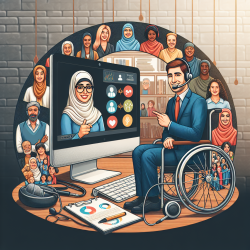In the ever-evolving landscape of online therapy, understanding the challenges and implementing recommendations from recent research can significantly enhance the quality of services provided. The study "Social accountability challenges and recommendations by community service rehabilitation therapists" offers valuable insights into the practical hurdles and potential solutions for therapists working in resource-constrained settings. Here, we explore how practitioners can leverage these findings to improve their skills and service delivery.
Challenges in Social Accountability
The study identifies four primary challenges faced by community service rehabilitation therapists:
- Budget and Equipment Constraints: Limited financial resources and equipment shortages hinder the ability to provide comprehensive care. For example, therapists often lack the necessary diagnostic tools and transportation for home visits.
- Staff Shortages: Many facilities rely heavily on community service therapists, who are often the only professionals available. This lack of experienced staff can lead to gaps in service delivery.
- Cultural and Language Barriers: Therapists frequently encounter patients whose cultural beliefs and language differences complicate effective communication and treatment adherence.
- Scope of Practice Limitations: Therapists are often unable to prescribe necessary medications, requiring patients to make additional trips to healthcare facilities, thereby delaying treatment.
Recommendations for Improvement
The research offers several recommendations to address these challenges:
- Collaboration with Community Caregivers: Engaging local caregivers can help identify patients in need and ensure they receive timely care.
- Service Inclusion in Primary Health Care Clinics: Increasing the frequency and duration of rehabilitation services at primary health care clinics can make these services more accessible.
- Executive Management Support: Greater understanding and support from senior management can facilitate better resource allocation and service delivery.
- Continuing Professional Development (CPD): Ongoing training in areas such as pharmacology, social services, and multicultural healthcare can better prepare therapists for the complexities of their roles.
Implementing Research Findings
Practitioners can take several steps to incorporate these recommendations into their practice:
- Advocate for increased budgets and better equipment to improve service delivery.
- Work with local caregivers and community leaders to enhance patient identification and care coordination.
- Engage in continuous professional development to stay updated on best practices and new treatment modalities.
- Promote the inclusion of rehabilitation services in primary health care settings to improve accessibility.
By understanding and addressing these challenges, online therapy practitioners can significantly improve their service delivery and ensure they meet the social accountability standards expected in healthcare.
To read the original research paper, please follow this link: Social accountability challenges and recommendations by community service rehabilitation therapists.










